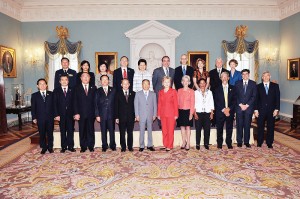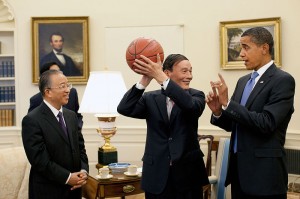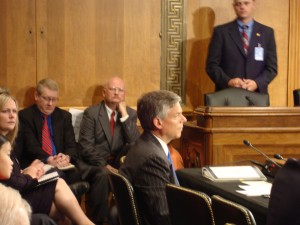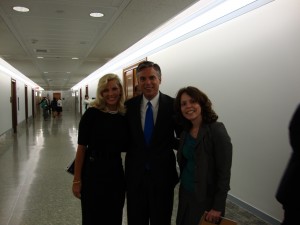What Came Out of the Strategic & Economic Dialogue?
This past Monday and Tuesday marked the sixth Strategic and Economic Dialogue (S&ED) between the U.S. and China. Formerly just the “Strategic Economic Dialogue” and before under the sole supervision of the U.S. Treasury

Secretary Hillary Clinton & State Councilor Dai Bingguo with the Strategic Track delegation, July 28, 2009 (White House Photo/Public Domain)
Department, the inclusion of the conjunction “and” to the title brings non-economic issues to the table as well as Secretary of State Hillary Clinton.
On day one of the two-day conference, President Obama spoke to the delegation, stressing the need for the U.S. and China to continue cooperation to guarantee a lasting economic recovery, to lessen the impact of climate change and promote “a clean, secure and prosperous energy future,” and to stop the spread of nuclear weapons in places like North Korea and Iran (these three issues were also the main thrust of an op-ed written by Secretary Clinton and Secretary of the Treasury Timothy Geithner in Monday’s Wall Street Journal) .
[youtube]4qAMaMlC1wA[/youtube]
Was the S&ED successful? Did it produce more than just mere rhetoric? At first glance, no. But in the relationship between the U.S. and China, sometimes even rhetoric is a step forward. See below for a review of the issues in greater detail.
(1) Climate Change
There was definitely paper success here. The U.S. and China signed a Memorandum of Understanding to Enhance Cooperation on Climate Change, Energy and the Environment (MOU), but the MOU just puts on paper existing relationships and does little to further climate change cooperation. Both governments promise to continue with the Ten Year Cooperation Framework on Energy and Environment signed just last year and both promise to promote cooperation on a variety of vague steps, including capacity building and cooperation “between cities, universities, provinces and states of the two countries.” Perhaps this shows a greater understanding on the part of U.S. policy makers that “capacity” is something that China sincerely needs assistance with (see The U.S. in Copenhagen: Preventing Another Toothless Tiger). Also, in a nod to the Chinese delegation’s claim of differing responsibilities between developed and developing countries, the MOU states “Consistent with equity and their common but differentiated responsibilities, and respective capabilities, the United States and China recognize they have a very important role in combating climate change” (emphasis added) Only time will tell if any of this rhetoric becomes a reality and whether the U.S. and China can reach an agreement in time for Copenhagen, an increasingly less likely proposition.
(2) Economic Recovery
Discussion regarding economic recovery was perhaps the most public, and most interesting, of all the talks. Showing the changing dynamic of the U.S.-China relations, Xie Xuren, the Chinese finance minister, called the U.S. to task and requested that it reduce its budget deficit. Holding an estimated $1.5 trillion in U.S. Treasuries, the Chinese government is concerned that an increased deficit could weaken the dollar, lowering the value of their Treasuries. At the same time, for the U.S. to decrease deficit it would need to buy less goods, further decreasing demand on China’s manufacturing sector (an unfortunate Catch-22 here for China). While Secretary Geithner promised the Chinese delegation that the U.S. would lower its deficit once recovery has begun, he also called upon the Chinese to increase

Who's got the ball? Vice Premier Wang Qishan with Pres. Obama at the Oval Office, July 28, 2009 (White House Photo/Public Domain)
domestic demand and lower the astronomically high savings rate of its people (estimated at 50%) in an attempt to rebalance the U.S.’ trade deficit with China.
(3) Currency
Always a thorny issue, the U.S.’ repeated request that China allow its currency to strengthen was most likely discussed during the S&ED. However, nothing about currency was mentioned publically.
(4) North Korea
China has taken a much more foreceful approach to North Korea. In May, when North Korea first began its saber-rattling, China spoke a hard-line against its neighbor, agreeing to abide by U.N. Security Council sanctions. Less clear is what actions China actually undertook to promote these sanctions. And although North Korea was a main point in President Obama’s speech before the S&ED, publically, neither the U.S. nor China made any statements on how they will cooperate to contain the country. Such silence is par for the course since North Korea is a very sensitive issue for China but at the same time, their assistance in dealing with the North Koreans is essential.
 On Facebook
On Facebook By Email
By Email 

